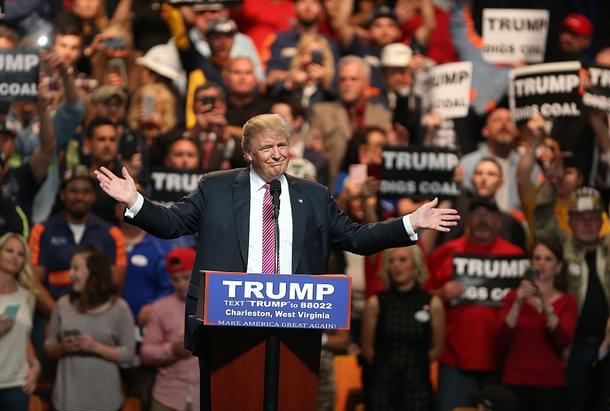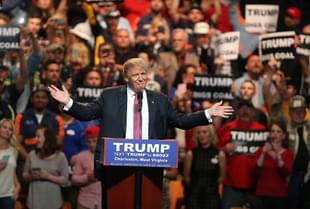World
Trump’s Realty Links To India: Why We Should Be More Worried Than The US
R Jagannathan
Sep 16, 2016, 11:22 AM | Updated 11:22 AM IST
Save & read from anywhere!
Bookmark stories for easy access on any device or the Swarajya app.


A Newsweek report on Donald Trump’s business interests all over the world raises the spectre that a presidency run by him, if it comes to be after November 2016, could impact the independence of US foreign policy. Given the Trump Organisation’s “deep ties to global financiers, foreign politicians and even criminals…if Trump moves into the White House and his family continues to receive any benefit from the company, during or even after his presidency, almost every foreign policy decision he makes will raise serious conflicts of interest and ethical quagmires,” the report informs us.
More interesting for Indians, the report talks of Trump’s big linkages to Indian realtors, including the Lodhas of Mumbai, the Ireo Group of Gurgaon (now Gurugram), and the Panchshil Realty Group of Pune, among others. While Mangal Prabhat Lodha is a BJP member, the Panchshil group’s Atul Chordia has ties to Sharad Pawar, and Madhukar Tulsi of Ireo is a relative of BJP spokesman Sudhanshu Mittal.
The question is this: will a President Trump, with deep business interests in Indian realty, be a threat to US foreign policy interests or Indian? This is something we should be concerned about and not the US, for Indian politics is closely linked to benami properties and illegal wealth hoards invested in property. If it came to a conflict of foreign policy interests, Trump’s clout will help the US trump Indian national interests and not the other way round.
The Trump connection to Indian realty is actually a danger to Narendra Modi’s plans to provide housing for al,’ because it could drive up land prices unreasonably high when property is already unaffordable to all but the super-rich. In fact, when Trump was in Mumbai in mid-2014, he made the ridiculous claim that Indian property was ultra-cheap. He told Financial Times at that time: “I like coming into markets where it is good for an investor to buy (property) and do something special. Prices in Mumbai, in my opinion, are unbelievably low.”
We know how well that forecast played out, with inventories in south-central Mumbai, where the Lodha Trump Tower is to be located, likely to rise to over 8,500 units in a few months’ time. This inventory will take more than six or seven years to sell, which will surely see the end of a Trump first term, if it happens. Trump, by trying to talk up the flagging Mumbai market, is thus an additional danger to sensible realty pricing. He is our problem, not a threat to US foreign policy – at least insofar as his Indian business interests are concerned.
However, even the larger question raised by the Newsweek report begs some counters. While there is no doubt that a businessman who becomes a politician and gains office as a result of an election win will indeed face numerous conflicts of interest, it is a bit rich for Newsweek to claim that this applies only to Trump. Wasn’t it an American President (Calvin Coolidge) who famously said that “the business of America is business?” Or something to that effect. If that is so, what matters is how you deal with conflicts of interest, and not in presuming that these conflicts will always impact policy, domestic or foreign.
Relationships between business and politicians in America have always been close, with super-achievers often moving between governmental and private sector roles with ease. Remember the closeness of Texan oil interests to George W Bush? Remember Hank Paulson, Treasury Secretary under Bush and a former Goldman Sachs CEO, who told a bunch of hedge fund managers a few weeks before Lehman went bust that Uncle Sam would soon be seizing Fannie Mae and Freddie Mac, two government-backed mortgage institutions. Paulson thus gave them insider information on shorting the market before the crash. No clash of interest? Paulson was not even investigated for wrongdoing.
Why go that far? It is now well established that Hillary and Bill Clinton Foundation received huge donations from Saudi interests, but Newsweek chose to rubbish this as not a serious future conflict of interest. Rather, it said, it did not matter as all the money went to charity. Said the report: “No member of the Clinton family received any cash from the foundation, nor did it finance any political campaigns. In fact, like the Clintons, almost the entire board of directors works for free.”
To assume that there is no conflict of interest if the money goes to charity is foolish, for no charity will kick its benefactors in the butt if there is a conflict of interest at some future date. The Saudis don’t pay good money just out of the goodness of their hearts.
The Newsweek report is interesting from an Indian perspective because it reminds us of the strong linkages between politicians and land prices and property.
There is almost no major politician who has not been conflicted by property links. Starting from the top, we had Sonia Gandhi and Rahul trying to appropriate Herald House using Congress party funds. Sonia’s son-in-law Robert Vadra was a huge property speculator in Haryana and Rajasthan when the Congress ruled those states. In Maharashtra, Sharad Pawar is a byword for property dealings. Congress politicians were up to their necks in the Adarsh Society scam. YSR’s son Jagan Reddy went to jail for his property and business deals. BS Yeddyurappa lost his chief ministership when his tenure was impacted by a land scam involving his sons. Manohar Joshi of Shiv Sena and Raj Thackeray of MNS both have property interests in Mumbai. And so on. No party, national or regional, is untainted by property linkages. Worse, even the media is complicit. In Delhi, and many states, journalists have been given cheap plots of land, thus ensuring that they are compromised in their reportage.
The main lesson for us to learn is simple: In the US, conflicts of interest get investigated. In India, we are blasé about this. Time we started working up a fit over conflicts of interest.
The other lesson to learn is this: Trump’s anti-Muslim rants endear him to many Hindu groups, but an Islamophobic US President will only make India’s own internal communal situation worse. On the other hand, Hillary Clinton’s Saudi links and alleged pro-Pakistan tilt should also be worrying us. Indian foreign policy is caught between a road and a hard place.
Neither Trump nor Clinton may be good for us. We have to be ready to defend our interests no matter which defective candidate the US voter puts in the White House.
Jagannathan is former Editorial Director, Swarajya. He tweets at @TheJaggi.





